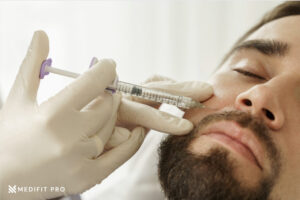Picture this: you’re in bed with your partner, the mood is right, and you’re ready for some action. But as you start getting intimate, you realise that your penis isn’t responding as it should. No matter how aroused you are, it stays soft and refuses to get hard enough for penetration. This can be an embarrassing and frustrating experience, and unfortunately, it’s a reality for many men around the world who suffer from erectile dysfunction (ED). Despite being a common condition, ED remains largely misunderstood and often goes untreated. In this article, we will delve into the fascinating world of erectile dysfunction, exploring its causes, symptoms, and the latest treatment options available to help men regain their sexual confidence and intimacy
Erectile dysfunction, commonly known as ED, is a condition in which a man is unable to achieve or maintain an erection during sexual activity. It can be a frustrating and embarrassing problem for many men, but it is important to understand that it is a common condition that affects up to 30 million men in the United States.
Symptoms of Erectile Dysfunction
• Difficulty achieving or maintaining an erection
• Reduced sexual desire
• Trouble getting an erection even when sexually aroused
• Inability to keep an erection during sexual activity
• Painful or prolonged erections
• Decreased penis size during erection
• Premature ejaculation
• Difficulty ejaculating
• Unsatisfactory sexual performance or experiences
• Decreased self-esteem and confidence due to sexual dysfunction
• Depression or anxiety related to sexual dysfunction.
These symptoms can have a significant impact on a man’s quality of life and can also affect his relationship with his partner.
Causes of Erectile Dysfunction
There are many causes of ED, including physical and psychological factors.
Physical causes:
- Cardiovascular Disease: Cardiovascular disease, such as heart disease and stroke, can restrict blood flow to the penis, leading to ED.
- Diabetes: Men with diabetes are more likely to experience ED due to nerve damage and blood vessel problems.
- High Blood Pressure: High blood pressure can damage blood vessels and restrict blood flow, leading to ED.
- Low Testosterone Levels: Low levels of testosterone, the male sex hormone, can result in ED.
- Obesity: Obesity can cause ED due to decreased blood flow and hormonal imbalances.
- Pelvic or Spinal Cord Injury: Injuries to the pelvic area or spinal cord can affect nerve function and cause ED.
- Smoking: Smoking is one of the major causes of erectile dysfunction.
Psychological causes:
- Stress: Stress and anxiety can cause ED by making it difficult to relax and focus during sexual activity.
- Depression: Depression can cause a decrease in libido and lead to ED.
- Relationship Problems: Relationship problems, such as communication difficulties and conflict, can contribute to ED.
- Performance Anxiety: Performance anxiety, or fear of not being able to perform sexually, can cause ED.
- Fear of Intimacy: Fear of intimacy or emotional vulnerability can cause ED by making it difficult to relax and be sexually aroused.
- Trauma: Traumatic experiences, such as sexual abuse or assault, can cause ED by creating psychological barriers to sexual activity.
- Guilt: Guilt related to sexual desires or past behavior can contribute to ED.
- Low Self-Esteem: Low self-esteem and negative body image can cause ED by affecting confidence and sexual performance.
Treatment Options
It is important to seek help and treatment for ED, as it can be a sign of an underlying health condition such as diabetes, high blood pressure, or cardiovascular disease. These conditions can also increase the risk of other health problems such as heart attack or stroke. By addressing ED, you may also be able to improve your overall health and reduce your risk of these other conditions.
Emotional Support
ED can also have a significant impact on a man’s mental and emotional well-being. It can cause feelings of embarrassment, low self-esteem, and depression. Seeking treatment can help to improve these feelings and improve overall quality of life. Here are a few things you can do to provide emotional support to an ED patient:
- Listen and Be Empathetic: Listen to the person’s feelings and experiences and be understanding and non-judgmental.
- Encourage Them to Seek Help: Encourage the patient to seek medical help and treatment for their ED.
- Offer to Go to Appointments with Them: Offer to accompany the patient to doctor appointments or therapy sessions to provide support.
- Practice Good Communication: Practice open and honest communication with the patient and work together to find solutions.
- Engage in Healthy Activities: Encourage the patient to engage in healthy activities, such as exercise and healthy eating, to improve their overall well-being. Also read How to Stay Motivated for Exercise
Medication
One of the most common treatment options for ED is medication. These medications work by increasing blood flow to the penis, which makes it easier to achieve and maintain an erection. Some of the most commonly prescribed medications for ED include
- Phosphodiesterase Type 5 (PDE5) Inhibitors: PDE5 inhibitors, such as sildenafil (Viagra), tadalafil (Cialis), and vardenafil (Levitra), are the most commonly prescribed medications for ED.
- Alprostadil: Alprostadil is a synthetic hormone that can be injected directly into the penis or applied as a pellet in the urethra.
- Testosterone Replacement Therapy: Testosterone replacement therapy can be used to treat ED caused by low testosterone levels.
- Apomorphine: Apomorphine is a medication that can be taken as a sublingual tablet or as a self-injection. It works by increasing blood flow to the penis and helps to produce an erection.
- Bimix and Trimix: Bimix and Trimix are combination medications that contain two or three different medications to increase blood flow to the penis. They are usually self-injected directly into the penis.
- MUSE: Medicated Urethral System for Erection (MUSE) is a small, medicated pellet that is inserted into the urethra to produce an erection.
Erection Device
Another treatment option for ED is a vacuum erection device. This device is a plastic tube that is placed over the penis, and a pump is used to create a vacuum. This causes blood to flow into the penis, resulting in an erection. The erection is maintained by a constriction ring that is placed around the base of the penis. This treatment option is non-invasive and can be used by men who are not candidates for surgery
Surgery
Surgery can also be a treatment option for ED. One surgical option is a penile implant, which is a device that is surgically inserted into the penis. This device allows the man to have an erection when he wants one, by manually pumping up the device.
Psychological Therapy
Psychological therapy is another treatment option for ED. This type of therapy can help to address the underlying psychological causes of ED, such as stress, anxiety, or depression. Therapy can also help to improve communication and intimacy in a relationship, which can be affected by ED.
Lifestyle Changes
Lifestyle changes can also be an effective treatment for ED. Maintaining a healthy diet, getting enough sleep, and exercising regularly can all help to improve sexual function. Quitting smoking and reducing alcohol consumption can also help to improve ED.
Herbal Remedies
There are various natural remedies that some men find helpful in addressing ED. These include herbal supplements such as ginseng, horny goat weed, and maca root. However, it’s important to note that these supplements are not regulated by the FDA and may have side effects or interact with other medications. It’s important to consult with a healthcare provider before taking any supplements.
Alternative Therapies
In addition to traditional treatment options, there are also alternative therapies that may be helpful for ED. These include acupuncture, yoga, and meditation. These therapies can help to reduce stress and anxiety, which can contribute to ED.
Always remember, it’s important to remember that ED is a common condition and that there is no need to be ashamed of it. Many men experience ED at some point in their lives, and there are many effective treatment options available. By working with a healthcare provider, most men can find a solution that works for you.
ED can be a symptom of other underlying health conditions, such as diabetes, high blood pressure, or cardiovascular disease. By addressing ED, men can also improve their overall health and reduce their risk of other health problems.
One must work with a healthcare provider to determine the best course of treatment for ED. Every man’s situation is unique, and the best treatment plan will depend on the underlying cause of the ED, as well as the man’s overall health and lifestyle.
In summary , ED is a common condition that affects millions of men worldwide. It can be caused by a variety of physical and psychological factors, and it can have a significant impact on a man’s quality of life. However, it is a treatable condition with various options like medication, therapy, lifestyle changes, alternative therapies and surgery. It’s important to address the issue with a healthcare provider and find a solution that works for you. Remember that ED is not a sign of weakness or a lack of masculinity, it’s a common health condition and seeking help is the first step towards resolving it.
Reference
https://www.mayoclinic.org/diseases-conditions/erectile-dysfunction/symptoms-causes/syc-20355776




























Recent Comments